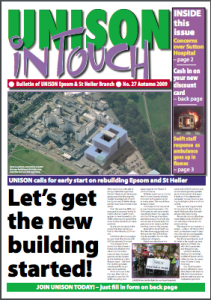One of the six new hospitals announced by the government last year could result in a loss of half the front line beds at the Epsom & St Helier University Hospitals NHS Trust, according to a detailed and damning 30-page response from the local UNISON branch.
Such a massive cutback – at a time when the coronavirus is focusing public attention on the inadequate numbers of general and acute beds available in England’s NHS after ten years of cutbacks – would fly in the face of the latest Planning Guidance from NHS England, which calls for front-line bed numbers to be maintained at least at the level of winter provision 2019-20: in Epsom & St Helier this is reported to range from 740-790 beds.
But now Merton, Sutton and Surrey Downs CCGs are consulting on four “options” for reconfiguring hospital services serving a population of 720,000 in South West London and Surrey, with the favoured “option 4” proposing a new £500m, 520 bed “specialist emergency care hospital” to be built on the old Sutton Hospital site .
But UNISON warns that after day care beds, maternity beds and 24 private beds are deducted from the total of 520 beds in the new Sutton hospital, the remaining numbers of “core” beds open 24/7 to treat emergency and waiting list patients at the would be reduced to just 386.
The favoured option would also move from the existing two hospital sites (Epsom and St Helier in Carshalton) to THREE. Both existing hospitals would be downgraded – each losing its A&E – and downsized, with bed numbers slashed from the present 454 at Epsom and 594 at St Helier to just 273 at Epsom and 183 at St Helier, with surplus land sold off in a bonanza for developers.
Epsom and St Helier hospitals would be left providing only an urgent treatment centre, “district hospital” and community hospital beds, day surgery and outpatients. ALL of the Trust’s reduced number of consultants, and all specialist surgery and treatment would be located at the new hospital in Sutton, leaving the district hospital beds staffed by less qualified “interface physicians” and a reduced proportion of registered nurses.
UNISON also warns of the probability that the location of the new hospital right next to the Royal Marsden Hospital and a new London Cancer Hub would result in staff, beds and theatre time being diverted to surgical work on Royal Marsden’s cancer patients (many of them private patients) – meaning a further loss of front line NHS beds for the 720,000 population who currently use Epsom and St Helier hospitals.
The 3-site system would also mean considerable numbers of patients would have to be transferred soon after surgery from the specialist beds in Sutton to complete their recovery in “step down” beds at Epsom or St Helier, while any district hospital patients developing complications would need to be transported by ambulance to Sutton.
UNISON is concerned that no proper reckoning seems to have been made of the impact this could have on ambulance services, and the need for additional vehicles and crew.
UNISON questions whether the proposals are the best – or indeed any kind of solution to the three problems which are cited as reasons why change is needed – shortage of staff, ageing buildings and financial pressures.
UNISON notes that other trusts in the area have similar staffing problems despite having centralised services on a single site, and that the plan ignores advice from the Royal College of Emergency Medicine that “Workforce shortages are a poor justification for service reconfiguration.”
The claimed financial savings from the proposals centre on a reduction in numbers and skill levels of staff, putting the scale and quality of patient care at risk: and UNISON argues that the plan is a costly way of tackling the Trust’s maintenance backlog of £96m.
 The union notes that among the various flawed plans that have come and gone over the past 20 years or more, the one that attracted widespread support was the 2009 plan to rebuild a new hospital on the St Helier site and upgrade Epsom, and advocates a return to this:
The union notes that among the various flawed plans that have come and gone over the past 20 years or more, the one that attracted widespread support was the 2009 plan to rebuild a new hospital on the St Helier site and upgrade Epsom, and advocates a return to this:
“For far less than £500m an updated version of the 2009 plan to build a new St Helier Hospital and upgrade and expand Epsom could deliver better results and better accessibility, leaving additional resources to improve and expand community health, primary care and mental health services.”
Dear Reader,
If you like our content please support our campaigning journalism to protect health care for all.
Our goal is to inform people, hold our politicians to account and help to build change through evidence based ideas.
Everyone should have access to comprehensive healthcare, but our NHS needs support. You can help us to continue to counter bad policy, battle neglect of the NHS and correct dangerous mis-infomation.
Supporters of the NHS are crucial in sustaining our health service and with your help we will be able to engage more people in securing its future.
Please donate to help support our campaigning NHS research and journalism.



Comments are closed.